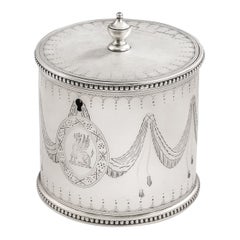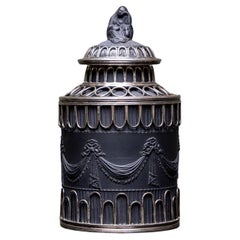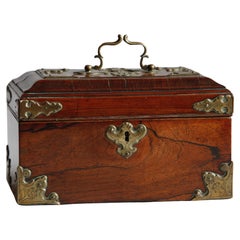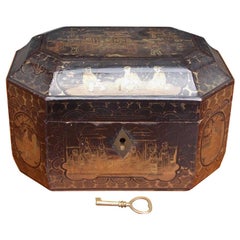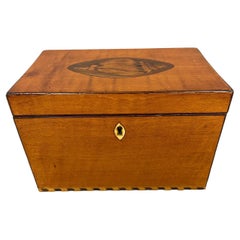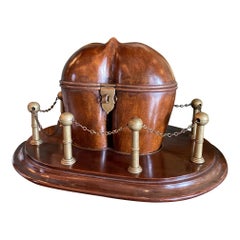Tea Caddies
18th Century English George III Antique Tea Caddies
Silver
Early 19th Century European Neoclassical Antique Tea Caddies
Silver
18th Century English Georgian Antique Tea Caddies
Brass
Early 1800s English George III Antique Tea Caddies
Pewter
Late 18th Century English George III Antique Tea Caddies
Satinwood
Late 18th Century English Georgian Antique Tea Caddies
Brass, Metal
Early 1800s English George III Antique Tea Caddies
Sterling Silver
18th Century English Georgian Antique Tea Caddies
Boxwood, Yew, Satinwood
19th Century English Georgian Antique Tea Caddies
Wood
18th Century English George III Antique Tea Caddies
Silver
Early 19th Century English George III Antique Tea Caddies
Fruitwood
Late 18th Century British George III Antique Tea Caddies
Boxwood
Mid-18th Century English George II Antique Tea Caddies
Wood
Early 18th Century English George II Antique Tea Caddies
Walnut
1790s English George III Antique Tea Caddies
Sterling Silver
Late 18th Century English Georgian Antique Tea Caddies
Boxwood
Late 18th Century English George III Antique Tea Caddies
Boxwood, Ebony, Satinwood, Tulipwood
18th Century English George III Antique Tea Caddies
Kingwood, Satinwood
Late 18th Century English George III Antique Tea Caddies
Yew
18th Century English Georgian Antique Tea Caddies
Boxwood, Satinwood, Tulipwood
Late 18th Century English George III Antique Tea Caddies
Wood, Boxwood, Satinwood
19th Century English George III Antique Tea Caddies
Mahogany
1790s English Neoclassical Antique Tea Caddies
Sterling Silver
Late 18th Century English George III Antique Tea Caddies
Yew
Early 1800s English Georgian Antique Tea Caddies
Paper
Late 18th Century English George III Antique Tea Caddies
Silver
1820s George IV Antique Tea Caddies
Amboyna
Late 18th Century English George III Antique Tea Caddies
Sycamore, Hardwood, Walnut, Satinwood, Boxwood
Early 19th Century English George IV Antique Tea Caddies
Brass, Pewter
Late 18th Century English Georgian Antique Tea Caddies
Oak, Burl
1810s British Georgian Antique Tea Caddies
Mahogany
Late 18th Century English Georgian Antique Tea Caddies
Boxwood, Yew
1780s English George III Antique Tea Caddies
Ivory, Mahogany, Satinwood, Paper
Late 18th Century English Georgian Antique Tea Caddies
Paper
1780s British Neoclassical Antique Tea Caddies
Sterling Silver
Late 18th Century British George III Antique Tea Caddies
Cut Steel
19th Century English George III Antique Tea Caddies
Wood
Late 18th Century English George III Antique Tea Caddies
Brass
Early 1800s English George III Antique Tea Caddies
Brass
19th Century George III Antique Tea Caddies
Mahogany
1780s European Neoclassical Antique Tea Caddies
Porcelain
1750s British George II Antique Tea Caddies
Sterling Silver
1790s English George III Antique Tea Caddies
Mahogany
Late 18th Century English Georgian Antique Tea Caddies
Mahogany
Early 1800s English Neoclassical Antique Tea Caddies
Sterling Silver
18th Century English George III Antique Tea Caddies
Silver
Vintage, New and Antique Tea Caddies
There are lots of uses for your vintage, new or antique tea caddies, but they can certainly serve their original intended purpose if needed.
When tea first gained popularity during the 1800s, and teatime became commonplace in homes all over England, it was an expensive commodity owing to excessive taxation. (This, of course, inevitably yielded a black market for tea leaves.) Tea drinkers hoarded their precious goods, which began to arrive in London ports from China during the 17th century, under lock and key. In luxury homes, tea leaves were stowed away in a decorative jar or canister called a tea caddy that was fitted with a lock, or, alternatively, the container was kept in a secured chest or storage cabinet.
Tea was thought to be not just a delicious drink but also to have medicinal benefits. The Chinese had been praising the healthy properties of tea, and wealthy Europeans were eager to discover its benefits for themselves during their ritual afternoon tea. The idea of “teatime” wasn’t a social event in upper-class British homes until the 1830s or 1840s. During Queen Victoria’s reign, small baked treats might be served with your beverage, and teakettles and coffeepots were part of tea services that could include teacups, saucers, a milk pot and other accessories.
When tea cultivation was relegated to British colonies such as India, and the British East India Company could no longer hold onto its trade monopoly with China, tea was no longer a ritual confined to the wealthy. Today, antique and vintage tea caddies are collector’s items all over the world.
Tea caddies weren’t unique to Europeans. The earliest pieces originated in China. Surviving hand-painted examples from China or elsewhere in Asia made of porcelain might feature enameled landscapes or other designs. At the Taft Museum of Art, there are striking enameled 18th-century-era tea caddies of copper that were given to the institution in 2014. Wooden tea caddies materialized over time and were seen as sturdier than their ceramic counterparts.
Today, there are all kinds of ways to use a vintage tea caddy if you’re passing on tea. They’re a welcome decorative flourish on the mantel in your living room, for example. A metal tea caddy, lined with a plastic bag, can be used to cultivate an herb garden on your kitchen windowsill. An old wooden tea caddy can help keep your paper clips or pushpins organized on your desk too. If you’re always on the go, a tea tin is good for packing earbuds, hand sanitizer, gum or whatever else that might get easily lost in a roomy crossbody messenger bag or other shoulder bag.
Teatime or not, find antique and vintage mid-century modern tea caddies, tortoiseshell caddies and more on 1stDibs.
